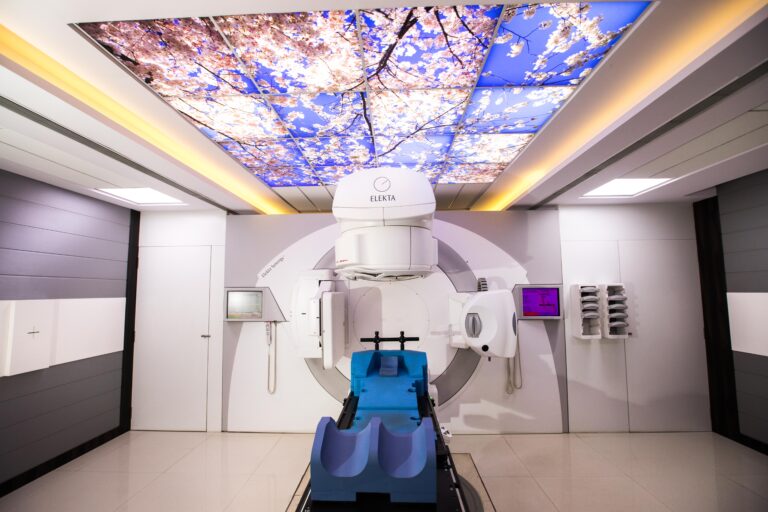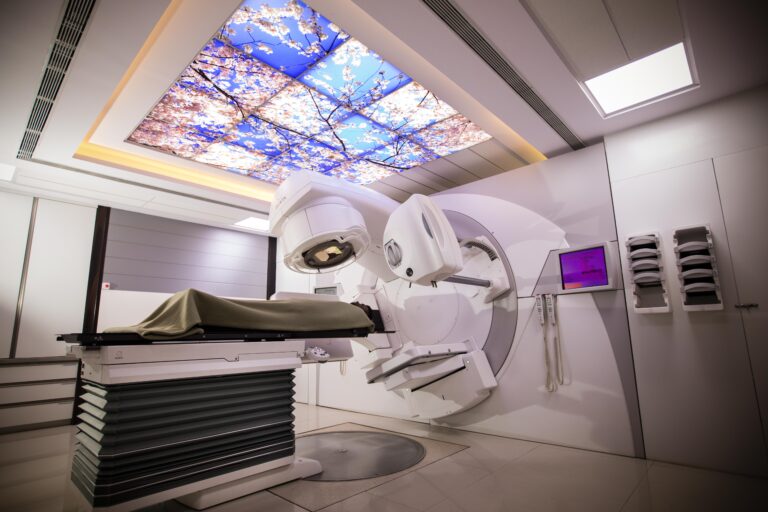Radiation Oncology in Satara
- Home
- Radiation Oncology in Satara



Radiation Oncology Services at a Leading Radiation Oncology Hospital in Satara
1. External Radiation Therapy (Linear Accelerator)
This cancer radiation treatment in Satara uses a machine called a Linear Accelerator (LINAC) to deliver focused radiation beams from outside the body.
At Onco-Life, we use the Elekta Synergy™ LINAC—a world-class radiation machine that delivers radiation with over 99% accuracy. It targets only the cancerous area, protecting the nearby healthy tissues.
Types of Treatments We Offer:
- 3D-CRT: Targets the tumour from multiple angles with precision.
- IMRT & VMAT: Advanced methods that adjust radiation intensity for better outcomes.
- IGRT: Uses real-time imaging to guide the treatment.
- SBRT & SRS: High-precision treatments for small, well-defined tumours.
- TSET & Total Body Irradiation: For specific skin or blood cancers.
- Electron Therapy & Breathe Hold Techniques: For shallow or moving tumours like in the breast or lungs.
Over 60% of cancer patients undergo radiotherapy treatment in Satara and worldwide as part of their treatment plan. It’s non-invasive, painless, and typically causes fewer side effects compared to other methods.
Our radiation team includes expert oncologists, physicists, radiation therapists, and support staff—trained at top hospitals in Pune, Mumbai, and Kerala—who ensure you receive safe, effective, and personalized care.
2. Internal Radiation Therapy (Brachytherapy)
Also called Brachytherapy, this method is an advanced form of radiation oncology in Satara that places a small radioactive source inside or near the tumour.
At Onco-Life, we use the Varian GammaMedPlus iX 24-Channel System, one of the most advanced internal radiation technologies in the world.
How It Works:
- A small implant (like a seed or capsule) is placed close to the cancer inside your body.
- It gives a strong dose of radiation to the tumour while keeping surrounding healthy areas safe.
- The implant may be temporary or permanent, based on your treatment plan.
Brachytherapy is commonly used for head & neck, prostate, breast, and cervical cancers, and may be combined with other treatments like surgery or external radiation for better results.
Why Choose Onco-Life for Radiation Therapy in Satara?
- High-end machines with global standards
- Over 99% targeting accuracy
- Minimal side effects
- Personalized treatment for every patient
- A highly experienced radiation team
- Integrated cancer care under one roof
Treatment Schedule
Monday to Saturday | 8:00 AM to 6:00 PM
We work hard to ensure minimal waiting time and a smooth treatment journey for every patient.
Onco-life uses highly advanced Elekta Synergy with Agility
The Modalities available are:
- 3-D Conformal radiation therapy with 6D Couch, delivers a high radiation dose to tumours but safeguards healthy tissue.
- Image-guided radiotherapy (IGRT), involves using a variety of digital imaging techniques to pinpoint the exact location of a targeted tumour while the patient is in the treatment position and just prior to delivering the treatment.
- Cone-beam Computed Tomography Systems (CBCT): are a variation of traditional computed tomography (CT) systems. The CBCT systems used to rotate around the patient, capturing data using a cone-shaped X-ray beam
- Intensity modulated radiation therapy (IMRT), is a revolutionary new modality in which radiation beams are shaped by 160 collimator leaves (Fingers) that wraps the radiation dose around a tumour, thus sparing healthy tissue.
- Volumetric Arc Therapy (VMAT): Technology which gives dose distribution similar to IMRT but delivers treatment in shorter duration.
- Stereo-tactic Body Radiotherapy (SBRT): for Lung tumours, Total Body irradiation, for the treatment of patients with leukaemia and lymphoma in preparation for bone marrow and stem cell transplantation.
- Stereotactic Radiotherapy (SRS): combines 3D imaging with multiple, highly-focused x-rays beamed at a tumour from different angles. Treatment machines automatically adjust for the motion of your breathing; making sure the beams precisely target a tumour and leave surrounding, healthy tissue untouched. Particularly effective for treating small, well-defined tumours in inoperable or surgically risky locations such as the brain and spine.
Most Popular Questions
Satara -Radiation Therapy: Frequently Asked Questions (FAQs)
1. What are the types of Radiation Therapy?
-
Radiation therapy is mainly given in two forms:
- External Beam Radiation (EBRT): A machine delivers high-energy X-rays from outside the body to the cancer-affected area.
- Internal Radiation (Brachytherapy): Tiny radioactive seeds or sources are placed inside or very close to the tumour.
Depending on your cancer type, location, and size, you may receive one or a combination of these. Your doctor will choose the best approach for you.
2. Who will be part of my radiation treatment team?
A team of trained experts will care for you:
- Radiation Oncologist: The cancer doctor who plans and supervises your radiation treatment.
- Medical Physicist: Ensures machines deliver the correct radiation dose safely.
- Dosimetrist: Calculates the exact dose of radiation needed for your tumour.
- Radiation Therapist: Operates the machine that delivers your treatment.
- Nurse: Helps manage symptoms and supports you through treatment.
- Dietitian, Social Worker, Physical Therapist, Dentist: Help with nutrition, emotional support, exercises, and oral health as needed.
3. Is radiation therapy safe?
Yes. Radiation has been used in cancer care for over 100 years. Today’s machines are highly advanced and precisely deliver radiation to the cancer area while sparing nearby healthy tissue.
4. Will I feel pain during radiation therapy?
No, the treatment itself is painless. It’s similar to getting an X-ray — you won’t feel anything when the radiation is delivered. Some mild side effects may occur later, but your team will help you manage them.
5. What side effects should I expect?
Side effects vary based on where you receive treatment. Common ones include:
- Skin redness or irritation (like sunburn)
- Tiredness
- Sore throat or difficulty swallowing (in neck radiation)
- Stomach upset (for abdominal areas)
Most side effects are temporary and manageable with medication and care.
6. Will I be radioactive after treatment?
No. You are not radioactive after external radiation. You can safely hug your loved ones and continue normal activities. Only certain internal radiation procedures (temporary implants) may require brief precautions, which your doctor will explain if needed.
7. How long will my radiation treatment last?
Most patients receive radiation once a day, 5 days a week, for 1 to 8 weeks, depending on the cancer type and treatment plan.
8. What happens if I miss a session?
Missing a session may delay your treatment. Try to attend every scheduled session. If you must miss one due to illness or other reasons, the session will be rescheduled.
9. Can I continue my daily routine during radiation?
Yes, in most cases. Many patients continue to work or do light daily activities. However, listen to your body — if you're feeling tired, rest is important.
10. Does radiation therapy cure cancer?
Radiation can cure cancer, control its growth, or relieve symptoms depending on the stage and type of cancer. It's often combined with surgery or chemotherapy for better results.
11. Will I lose my hair during radiation?
Only if the treatment is near your scalp. Unlike chemotherapy, radiation causes hair loss only in the area being treated — not all over the body.
12. Can I eat normally during radiation therapy?
Yes. But depending on where you're receiving radiation (e.g., mouth, stomach), you may need a special diet. Our dietitian will guide you on the best foods to eat to stay strong.
13. How will radiation affect my skin?
The treated area may feel dry, red, or itchy — like a mild sunburn. Your team will give you creams and tips to protect your skin.
14. Is radiation safe for older adults or people with other health conditions?
Yes. Radiation can be safely tailored for patients of any age, and special precautions are taken for those with other health issues.
15. How will I know if the treatment is working?
Your doctor will monitor progress with regular check-ups and scans. In some cases, visible improvement is seen during or soon after treatment.
16. Can I drive myself to treatment?
Yes, most patients can drive. If you're feeling weak or tired, it’s safer to have someone accompany you.
17. Can I shower or bathe during treatment?
Yes. You can bathe, but be gentle with the skin in the treatment area. Avoid scrubbing or applying lotions unless approved by your radiation team.
18. Will radiation affect my fertility or sexual health?
It depends on the area being treated. Your doctor will discuss this with you if relevant and suggest ways to protect reproductive health if needed.
19. What should I wear to radiation sessions?
Wear loose, comfortable clothes that are easy to remove. You may be asked to change into a gown for treatment.
20. Is radiation therapy covered by insurance?
Yes. Most private and government insurance schemes cover radiation therapy. Our TPA desk will help you with documentation and approvals.
